BWW Exclusive: Theater Critic Matt Windman Returns to French Woods for All-Female 1776
Mr. John Adams Meets Ms. John Adams...
The lyric "Cool, Considerate Men" isn't quite the same as before when it is being sung by all women.
Two years ago, I revisited French Woods Festival of the Arts (which I attended from 1999 to 2002 as a camper/teen actor and then as an assistant director/stage manager) and BroadwayWorld kindly published an article I wrote about the experience. In light of my responsibilities at work (attorney by day, theater critic by night) and at home (including a hyperactive toddler and commuting daily between NY and NJ), I was not planning on visiting again this past summer, but that instantly changed when I learned that the camp was planning on presenting 1776 for the first time in nearly two decades - and with an all-female cast.
My biggest accomplishment from my time at French Woods (not that there were so many of those...) was no doubt playing John Adams in 1776 in 2001. Considering that it was my one and only leading role in a musical - ever - I have a lot of theories about how I landed the role, but that is for another day and time. Although the production (directed by camp owner Ron Schaefer and conducted by Brian Worsdale) came off relatively well, French Woods subsequently refrained from presenting 1776 again, likely because the camp has always had significantly fewer male campers than female campers, and 1776 contains 25 male roles and just two female roles (i.e. Abigail Adams and Martha Jefferson).
In retrospect, it is surprising that French Woods did not previously attempt 1776 with an all-female cast (or at least with women playing some of the roles), but this marked as good a time as ever. However, doing so presents significant challenges, such as how having young women play famous male historical figures such as John Adams, Benjamin Franklin, and Thomas Jefferson affects the musical overall, and the need to transpose the score and orchestrations to better suit their voices.
I certainly wanted to see how French Woods would handle the challenge, so I set up visiting the camp, which also gave me an opportunity to speak with the wonderful 1776 cast, conduct a masterclass on theater criticism with interested campers, and sit in on rehearsals of productions of Matilda (directed by Beth Schaefer) and The Pirates of Penzance (directed by Ron Schaefer) and a recording session with the camp's symphony orchestra and Cabaret Troupe of an original song written by French Woods music director Josh Freilich celebrating the camp's 50th anniversary. (In 2002, Josh was the music director of a production of Pippin in which I was a stage manager.)
Sitting In On Rehearsals:
I arrived at the camp on Saturday, August 10, 2019 in the early morning. Ron Schaefer immediately ushered me to a rehearsal studio where the cast of his production of The Pirates of Penzance was singing through the lengthy finale of the first act. Ron has directed Pirates (along with The Mikado) many, many times at camp, including back when I was a camper. And unlike a great deal of other amateur productions of Pirates, Ron uses the original script, score, orchestrations, and choral arrangements, dating back to 1879 - rather than the watered-down 1981 Broadway revival version. (As for The Mikado, Ron admitted that the camp in unlikely to produce it again anytime soon - for obvious reasons. For a better explanation, Google "Mikado" and "NY Gilbert and Sullivan Players.")
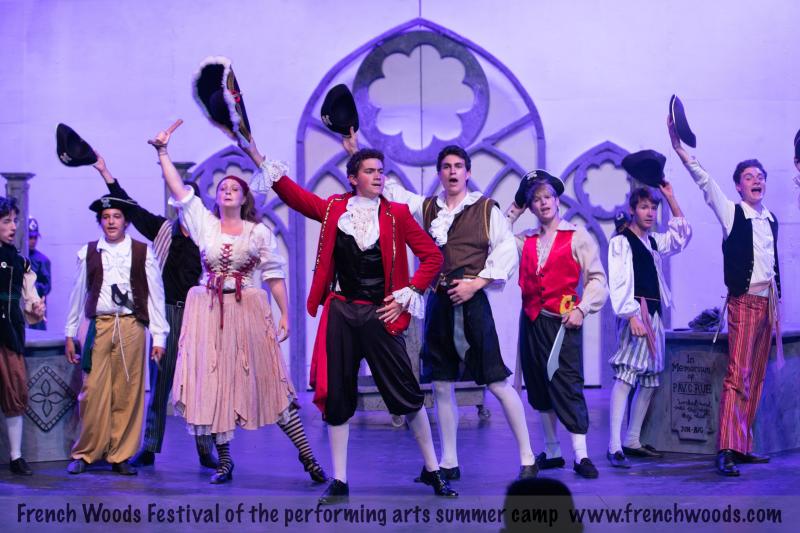
Playing the Pirate King in Pirates was 15-year-old Hudson Flynn of New York City, son of Broadway actress Andrea Burns, who went to French Woods herself years ago and who turned up herself that same day in order to see Hudson play Romeo in Romeo and Juliet. During rehearsal, Ron gleefully advised Hudson that he had permission to "play with anybody in the cast" in order to heighten the comedy. (I recall Ron giving the same advice two decades ago to 14-year-old Gabe Millman when he played Pseudalus in his production of Forum.) I also heard from many staffers that Hudson that just given a standout performance as Christopher Boone in the camp's production of The Curious Incident of the Dog in the Night-Time, which was directed by Anne McAlexander and presented in-the-round, craftily using chalk on the stage floor instead of digital effects.
Soon afterwards, I was escorted to the Pavilion theater, where Beth Schaefer's production of Matilda was in rehearsal. (Beth's production of Violet was receiving its final performance that night.) The cast and crew of Matilda had broken up into separate small groups rehearsing different sections of the show onstage, outside, and backstage. Matilda was to be the final/closing show of the summer, meaning that it would be performed on the last night of camp in front of all campers and staff members. Playing the over-the-top and villainous Miss Trunchbull was 16-year-old Collin Flanagan, who had just finished playing Shakespeare in Ron's amateur premiere production of Something Rotten!.
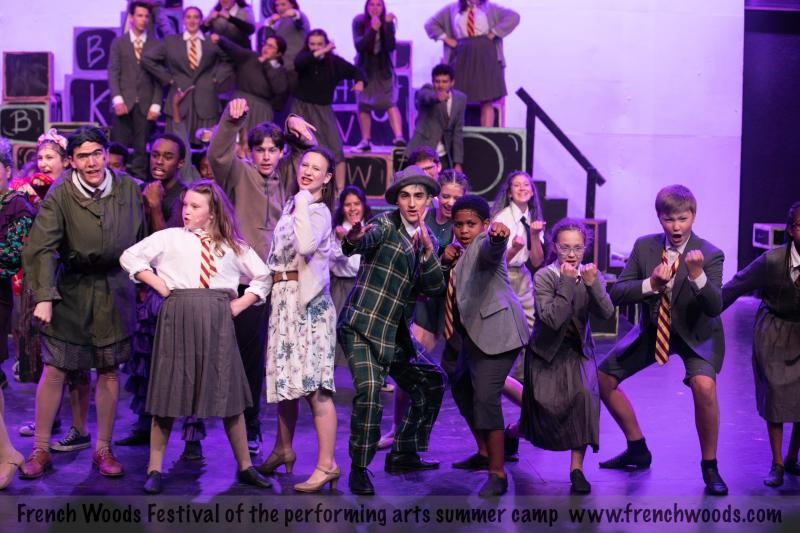
To my surprise, during Matilda rehearsal, I ran into my friend and Broadway actress Celia Mei Rubin, who once upon a time attended French Woods with me (and appeared with me in productions of West Side Story and Camelot on the Pavilion stage), who had come up to French Woods that day in order to teach a Matilda dance masterclass. Celia was a dance captain and swing in the Broadway production of Matilda. She was also on the verge of jetting off to Houston in order to play Val in the Theatre Under the Stars' production of A Chorus Line. Needless to say, Celia appeared in A Chorus Line at French Woods, playing Sheila in 1997.
Later in the day, I briefly attended a rehearsal of Mamma Mia!. Unlike Pirates and Matilda, Mamma Mia! was a middle camp production, meaning it would be performed by campers ages 11 to 14 instead of 11 to 17. (There are also lower camp productions for campers ages 7 to 11). Thirteen-year-old Arden Wolfe of New York City, who was playing Donna Sheridan, shared that she had seen the show on Broadway with her grandmother and was honored to be playing the role at camp. I could not help but question Matt Stern, a music director on the production, over whether they would stage the post-curtain call mega-mix. Stern, admitting that the ensemble did not have a lot to do during the second act, sounded open to it. Aaron Farenback-Brateman, the director of the production, later insisted that the mega-mix was always going to be staged because "it is a show for moms and it is their favorite part of the show." As for the ensemble, he added that "we do our best to make the experience awesome for every kid in the show, which is why, even though it is not essential, the ensemble was involved in 10 numbers in Act Two."
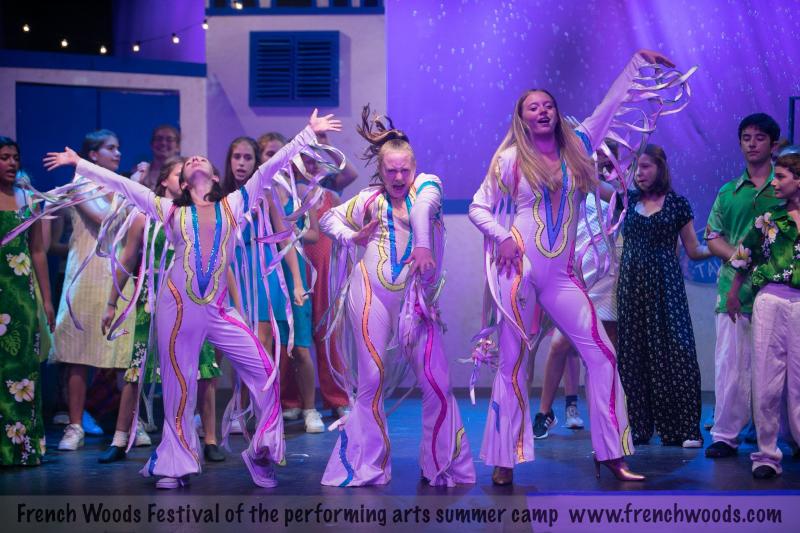
Theater Criticism Masterclass:
The last time I visited the camp two years ago, I spoke to a handful of campers about being a theater critic in a hastily arranged meeting in Ron Schaefer's office. This time, the class was held in the Catbox Theater, where I performed in 1776 and where Romeo and Juliet was being performed that night. Approximately 25 campers attended. In an ideal world, a masterclass or workshop on theater criticism should involve students writing their own reviews and revising them after receiving constructive feedback. But since I only had an hour's worth of time, the masterclass took the form of a constructive dialogue between myself and the campers in which we discussed issues such as the essential functions of the theater critic, the repercussions of negative reviews, what belongs and does not belong in a theater review, YouTube critics, walking out of shows, jukebox musicals, and musicals aimed at younger audiences. Ron Schaefer, who sat in the session, asked specifically what new Broadway shows the campers should see.
The campers asked serious questions, made intelligent points, and displayed a comprehensive knowledge of theater, especially of contemporary Broadway musicals. This is not surprising. Unlike in my day, French Woods (throughout its four three-week-long sessions) now transports campers to three new Broadway musicals each summer - most recently Hadestown, Be More Chill, and The Prom, which is slated to receive its amateur premiere at French Woods next summer. I was particularly surprised that Be More Chill (which I cheered as a theater critic, unlike some others) received a mixed reaction from the campers.
The New York Pops at French Woods:
To my surprise, the show that everyone at camp seemed most excited about was not a musical or play, but rather an orchestra concert. In my prior article on French Woods, I forgot to mention one of the camp's most exciting new programs: an ongoing collaboration between French Woods and the New York Pops, put into place largely by longtime French Woods conductor Brian Worsdale, in which members of the New York Pops orchestra come up to the camp to work with student musicians and then play alongside them in a concert featuring soloists from both the camp and Broadway (which have previously included Kerry Butler, Laura Osnes, Betsy Wolfe, Ryan Silverman, and Max von Essen). This year's New York Pops concert took place shortly after my visit and celebrated Ron Schaefer's 80th birthday. A few weeks later, the New York Pops honored Ron for his extensive work as an arts educator at its annual cabaret concert at the nightclub 54 Below.
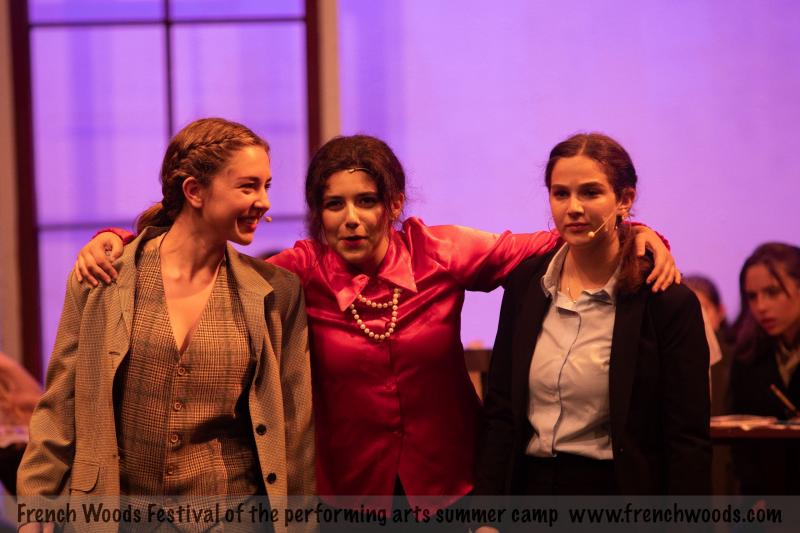
All-Female 1776:
I was particularly glad that the camp provided me with an opportunity to speak with most of the cast of 1776, along with its director, Jessica Bashline, who just recently also directed Gypsy at NYU Steinhardt. Bashline, who was once a camper at French Woods herself, explained that she had only seen 1776 once in her life - at camp in 1991, with Beth Schaefer playing Abigail Adams. Apparently, Jessica and Beth had a "crazy conversation one night" which somehow led to the idea of presenting 1776 again at camp but with an all-female cast. Bashline explained that she had not previously been a fan of the show, adding "I didn't see myself in it." Bashline did not consider her production to be gender-blind. Rather, the show's historical characters were being played as women - even though virtually none of the text had been altered.
Playing John Adams was 17-year-old Gabriella Baldacchino of Glen Rock, NJ, who was on the verge of leaving camp and starting as a freshman at USC. "There's something so empowering about walking onstage for that first time as John Adams, with the first monologue, and then turning around and seeing a room of women," Baldacchino said. "The fact that an entire congress of women is making the decisions and laying down the rules is something we so rarely see. We can all speak equally and not have to feel like we are inferior to male figures."
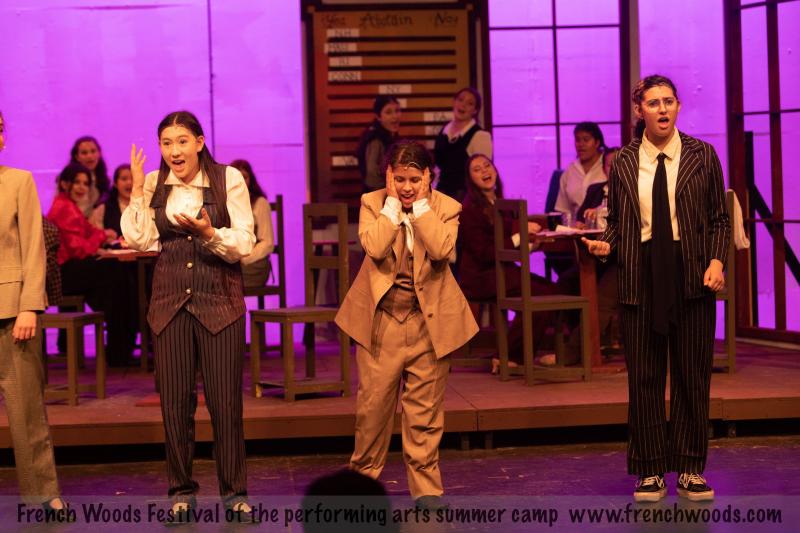
Julia White of Westchester, NY, who was playing Benjamin Franklin, described a rehearsal process that was collaborative, challenging, and rewarding. "We're playing these really set men and playing them as women. It was a challenge for me to get into that mindset because in most productions, being a woman has just meant being the character," White said. "Some of Ben Franklin's lines are really raunchy and are not what a woman would say at all...It's empowering. It changes your whole vision and physicality when you put yourself into that mindset."
Maya Jaffe of Washington, DC, who was playing Edward Rutledge of South Carolina, suggested that having an all-female cast has made the show's memorable finale (in which the members of the Second Continental Congress sign the Declaration of Independence following an extended debate and difficult vote) even more powerful. "It ties it all together with a bow," Jaffe said. "They are all women, all making decisions, all fighting for their own things. They are together." Jaffe also spoke of the strange thrill of playing a ruthless and loathsome figure such as Rutledge. "My favorite part of my character is when Caesar Rodney leaves and I laugh this maniacal laugh. It's the scariest thing I've seen in my life." Bashline then described Jaffe's take on the character as "Mitch McConnell in pearls."
1776 was conducted by Brian Worsdale (who also conducted my production in 2001) with a full orchestra, using revised orchestrations created by Josh Freilich to suit the female voices. The production was set in the present day and in modern attire, with a CNN-like news ticker at the side of the stage providing updates on the Second Continental Congress and the Revolutionary War. In an interesting but questionable move, the set of the congress hall was shifted 180 degrees following intermission, which made it impossible for my section of the audience to see the all-critical vote tally board (which notes which states have voted yea or nay for independence at each point in the show). In one moment I will not soon forget from the song "Cool, Considerate Men," the conservative members of congress showed off their pistols and holsters.
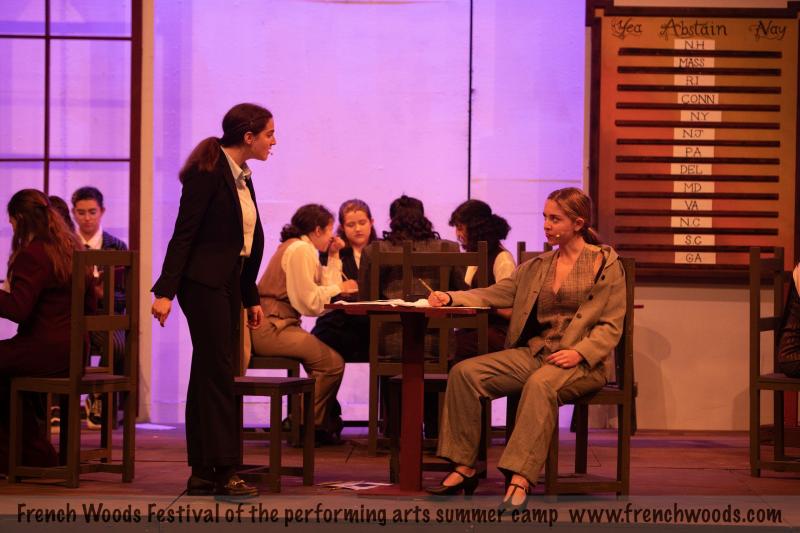
Because the campers playing congressional secretary Charles Thomson apparently dropped out during rehearsals, Thomson's lines were assumed by different characters, including the courier, who read aloud many of the letters of George Washington that the carrier had just delivered to the congress. The show's finale was also altered to the extent that the characters did not sign the Declaration of Independence, but instead stood and looked forward silently and resolutely, while Andrew McNair, the congressional custodian, stared at a copy of the declaration and then at the characters. I had mixed feelings about the new orchestrations, but that may have been the result of my overfamiliarity with and attachment to the original score and orchestrations. In any event, Josh Freilich deserves a huge amount of credit for assuming and completing the transposition work.
The cast was completely engaged and engaging to behold. As John Adams, Gabriella Baldacchino removed the overwrought bluster that has become associated with the role and made Adams more nimble, innocent (perhaps because Adams is so glued to his, or rather her, work) and sensitive. In retrospect, when I played Adams, I probably copied from the iconic performance of William Daniels (preserved in the extremely faithful film version) far more than I should have. Baldacchino's performance also brought to mind the youthful look and upbeat and uncompromising spirit of Alexandria Ocasio-Cortez.
To me, Julia White's frisky Benjamin Franklin was a dead ringer for Kim Cattrall in Sex and the City. (When I mentioned this observation to director Jessica Bashline, Bashline wondered whether White was too young to even know of Catrall.) White's performance was completely in synch with the notion of reinventing these historic men as women while staying true to the characters themselves. Makayla Fetterman's Richard Henry Lee brought to mind a loud and inebriated Mama Rose from Gypsy. As Thomas Jefferson, Teshura Goldman was bookish and tongue-tied. While struggling to write the Declaration of Independence, Goldman dropped to the stage floor and made a snow angel in a mass of discarded pieces of paper. Maya Jaffe's Edward Rutledge was high-powered, fearless, and pretty damn scary. As for the two female campers playing the show's two female characters, Madeline Dick and Tiffany Kumar beautifully sang the roles of Abigail Adams and Martha Jefferson respectively. Not only that, they also played doubled as male characters.
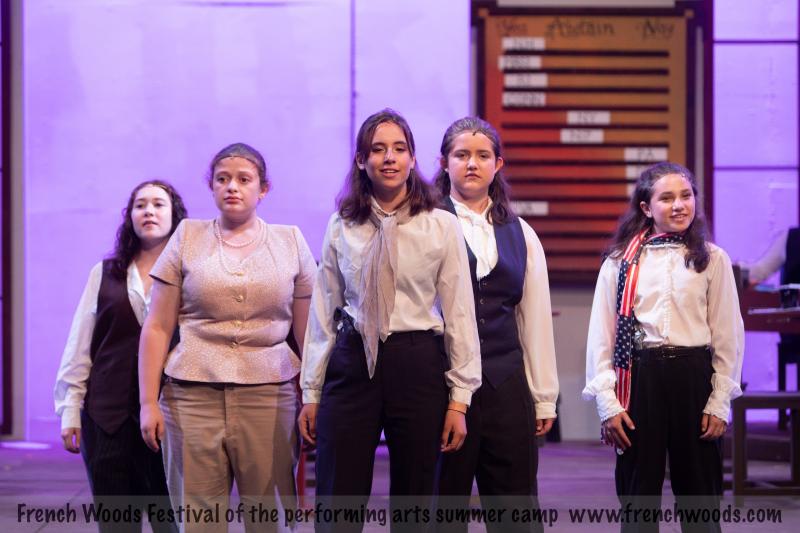
1776 has been one of my favorite musicals since I attended the Broadway revival in 1998 at the age of 14. I have since seen professional revivals at the Ford Theatre (2003 and 2012), Paper Mill Playhouse (2009), and City Center (2016). This was, without question, the most freethinking and risk-assuming production I have seen to date. It can't help but wonder what kind of changes may be in store when director Diane Paulus brings it back to Broadway in 2021. It also makes me hope that it could lead to similar kinds of experimental and female-empowering productions at French Woods. Just as meaningful as sitting through 1776 was hearing from its cast members how much they got out of the unorthodox rehearsal and production process.
Such was a wonderful return visit to French Woods. We shall meet again!
Videos

